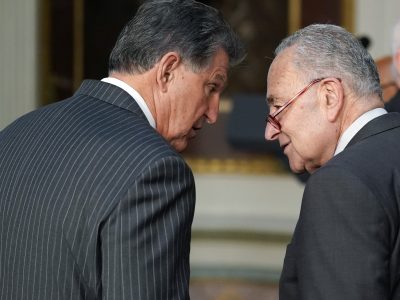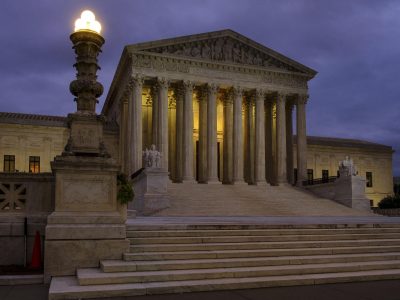Administrative Law
The Side Deal
How would the Manchin-Schumer deal on permitting impact the environment?
To get Manchin’s vote for the $379 billion in environmental spending in the IRA bill, Schumer and other congressional leaders had to agree to support Manchin’s efforts to speed up the permit system. At this point, all we have is a one-page list of permitting changes that would form the basis of a new bill. …
Continue reading “The Side Deal”
CONTINUE READINGBracket Creep at OIRA
There’s an embarrassing economic blunder in how OIRA’s jurisdiction is defined.
The Biden Administration is considering changes to how OIRA, the “regulatory czar,” operates. There’s one simple fix the Administration should make. OIRA core function is cost-benefit analysis But the rules establishing OIRA’s jurisdiction contain an error that should make an economist blush: using nominal rather than real (inflation-adjusted) dollars. This means that OIRA is now …
Continue reading “Bracket Creep at OIRA”
CONTINUE READINGClimate Change and the Major Question Doctrine
Just because a regulation involves climate change, that doesn’t make it a major question.
Red State AGs are preparing to go to town with the West Virginia case. They seem to think that everything involving climate change automatically becomes a major question. That’s simply wrong. The doctrine is more nuanced. Recall that the Supreme Court struck down OSHA’s vaccine mandate, essentially on major questions grounds, but the majority found …
Continue reading “Climate Change and the Major Question Doctrine”
CONTINUE READINGEmerging Answers to Major Questions
We’re beginning to get a clearer understanding of the major questions doctrine.
In November, I wrote a post posing “some major questions about the major questions doctrine.” In West Virginia v. EPA, Chief Justice Roberts starts supplying some answers to those questions. In particular, he seems to be using a narrower four-factor approach to decide what constitutes a “major question.” As we all know, the West Virginia case …
Continue reading “Emerging Answers to Major Questions”
CONTINUE READINGThe Supreme Court Curbs Climate Action
The ruling in West Virginia v. EPA was about as good as we could expect given the makeup of the Court.
Today, the Supreme Court decided its most important environmental case since 2007. We didn’t dodge the bullet. It’s more than a flesh wound but it didn’t hit any vital organs . Chief Justice Roberts’s majority opinion leaves EPA other options to reduce carbon emissions from coal-fired power plants. It also gives a fairly narrow reading …
Continue reading “The Supreme Court Curbs Climate Action”
CONTINUE READINGUnquantified Benefits
How can the government account for benefits that it can’t measure?
Like it or not, quantitative cost-benefit analysis has been a key part of the regulatory process for forty years and seem likely to stay that way. Yet even economists admit that they don’t (yet) know how to put numbers on the value of some important regulatory benefits. But how can those qualitative assessments be combined …
Continue reading “Unquantified Benefits”
CONTINUE READINGTwo FERC Cases and Why They Matter
Last week’s D.C. Circuit cases illustrate why environmental lawyers need to understand FERC.
The Federal Energy Regulatory Commission (FERC) has been called the most important environmental agency that no one has heard of. At the end of last week, the D.C. Circuit decided two undramatic FERC cases that illustrate FERC’s environmental significance. One involved a bailout to coal and nuclear plants, the other involved water quality. The first …
Continue reading “Two FERC Cases and Why They Matter”
CONTINUE READINGEquity Weighting: A Brief Introduction
An unfamiliar concept for most that just might make cost-benefit analysis more progressive.
A technique called equity weighting could make regulation more progressive. Implementing this technique may be harder than it sounds, however, for a variety of practical, legal, and political reasons. Agencies might do best to use equity weighting as a way to check their regulatory decisions rather than as their main decision tool.
CONTINUE READINGAn Abundance Research Agenda
If we need to build lots of things fast to address climate and housing crises, how will we do that?
There’s been a lot of buzz about this column by Ezra Klein in the New York Times. Klein’s basic argument: We need to do a lot of infrastructure and other development projects to make the world a better place. For example, we’ll need to build power lines and renewable projects to address climate change. But …
Continue reading “An Abundance Research Agenda”
CONTINUE READINGSmoke But No Fire
No, the draft Supreme Court abortion decision doesn’t threaten the standing of environmental groups
The implications for environmental law are far from being the most important aspect of the leaked draft of a Supreme Court opinion overruling Roe v. Wade. The aggressiveness of the opinion in the Dobbs case signals a kind of activism that is definitely worrisome in other areas. At the end of last week, however, there …
Continue reading “Smoke But No Fire”
CONTINUE READING












